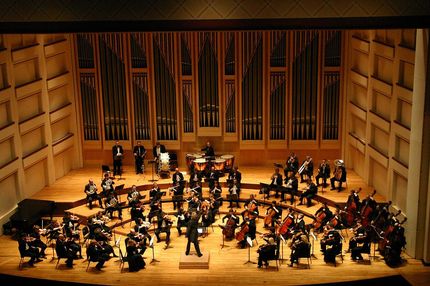Is there a secret (a how to) to listen to classical music?: originally appeared on Quora: The best answer to any question. Ask a question, get a great answer. Learn from experts and access insider knowledge. You can follow Quora on Twitter, Facebook, and Google+.
Answer by David Leigh, I'm an opera singer

Courtesy of Derek Gleeson
There are a bunch of secrets to listening to classical music. For me the big turning point was recognizing the chronology of the music, so you can actually get in a composer's head.
When Beethoven's Eroica symphony was premiered, for example, its sheer scale was so immense as to baffle listeners of the time. Never had a sonata development been nearly so long. But how can you, as a modern listener who's heard Wagner (and, for that matter, The Velvet Underground), possibly conceive of how shocking that must have been to a listener of the time? Only by actively putting yourself in the position of being shocked.
Most modern listeners are single-issue voters: it's all about the melody. The problem is that in pieces like the Eroica (and in most Beethoven), the melody is barely the point on any level. The Eroica melody is just an arpeggio and an unexpected harmonic shift. What would have been engaging to an audience at the time, though, was the way Beethoven plays with form. There are moments where he stretches long, exciting sections of music, or fakes you out, etc. If you learn to hear the way an audience at the time heard, you'll find all of this stuff incredibly exciting.
And the good news here is that audiences at the time didn't (for the most part) take music classes or go out of their way to educate themselves on the subject. What they did do was only listen to music of one era at a time. There wasn't really a sense of "canon" yet, so if you lived in the 1820s, you were pretty much listening only to music of that time. Challenge yourself to do the same. Spend a week listening only to Handel; I'd be willing to bet that, without doing any extra research, a Haydn or Mozart Symphony would blow your mind after that week. Rinse, repeat with Beethoven. Rinse, repeat with Brahms. Rinse, repeat with Wagner. Rinse, repeat with Stravinsky. Rinse, repeat with Cage. Rinse, repeat with Adams. Approaching the music this way will give you a real sense of context for everything. There's nothing more fun than listening to a piece of music and "getting all the jokes." And especially if you're into good modern composers, this is the way to get into them. What makes these guys special is the rules they chose to break, and you can only really know that viscerally if you're acclimated to those rules when you listen.
More questions on Quora:
